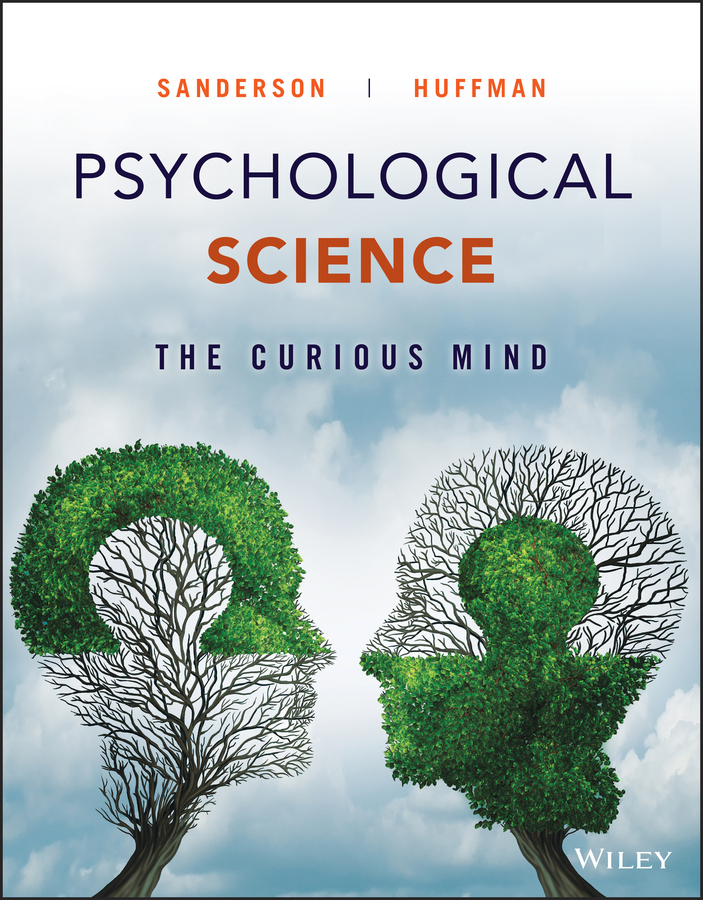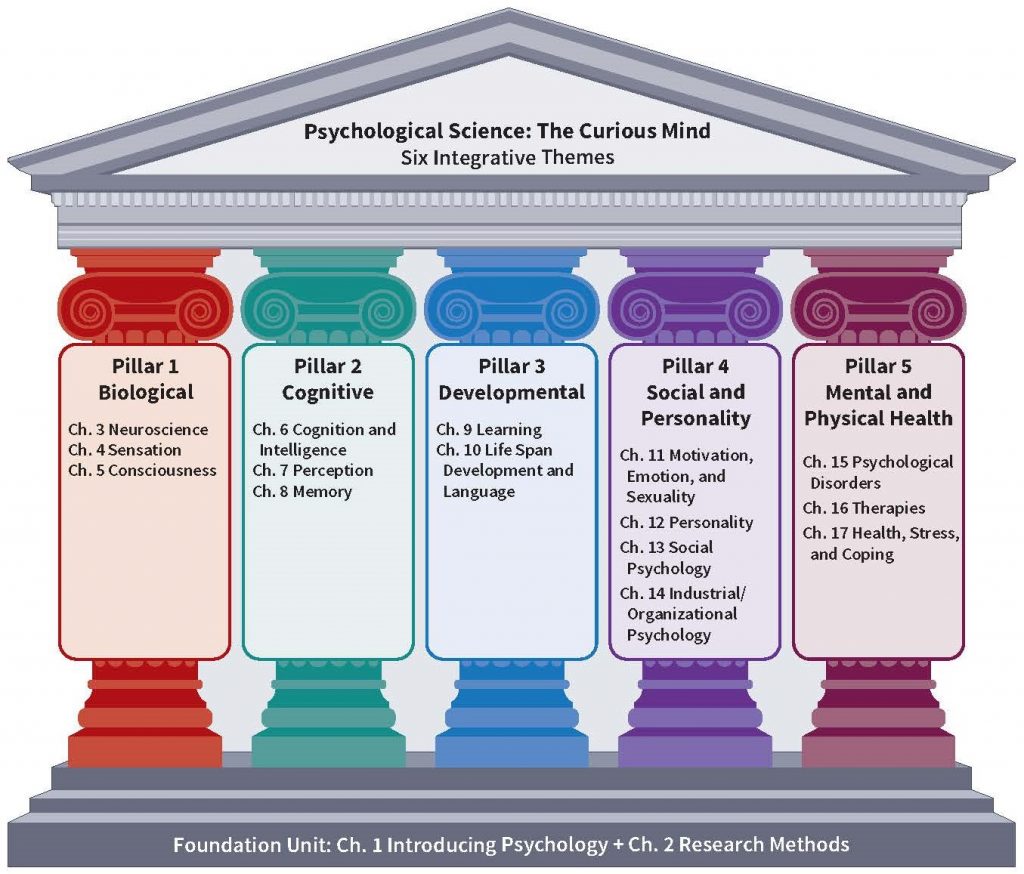
Psychological Science: The Curious Mind, 1st Edition
By Catherine A. Sanderson and Karen R. Huffman
Psychological Science: The Curious Mind, 1e, by award-winning authors and professors Catherine A. Sanderson and Karen R. Huffman, introduces 21st-century, digital-native students to the fascinating field of psychology with contemporary, comprehensive courseware—WileyPLUS. This rich courseware blends text, videos, animations, interactive learning objects, and various online assessment content, including a robust adaptive assignments offering. This new program emphasizes the importance of developing scientific literacy and an understanding of research and research methods. The program uses an inviting why-focused framework that taps into students’ natural curiosity, incorporating active learning and real-life application to engage students. Psychological Science: The Curious Mind, 1e, embraces the guidelines released by the American Psychological Association (APA)’s Introductory Psychology Initiative (IPI) in 2021. It provides an excellent framework for instructors who want to implement those guidelines in their Introductory Psychology courses, and it provides students with the content and motivation to achieve the course’s ultimate outcome: an enduring, foundational understanding of psychological science.
Schedule a Demo Request Instructor AccountWant to learn more about WileyPLUS? Click Here
Adaptive Assignments
Adaptive Assignments ignite students’ confidence to succeed in the course. By continuously adapting to each student’s needs and providing achievable goals with just-in-time instruction, Adaptive Assignments close knowledge gaps to accelerate learning.
Chapter Introduction Videos
Author Catherine Sanderson introduces students to the topic they are about to study in a casual, conversational way to pique curiosity and give practical, everyday context.
Companion Videos
Several short videos complement the reading content in each chapter section. All videos in a chapter serve as the input for a Chapter Section Preview question set and a Chapter Section Review question set.
Topical Videos
In each of these vibrant video presentations, the authors go in depth on a key topic. Each video has a corresponding Video Quiz question set for instructors to use when creating assignments.
Animations
These engaging animations illustrate difficult-to-learn concepts from a real-world perspective and are included within the module where the topic is being discussed.
Interactivities
Illustrations, charts, tables, and process diagrams are available in various interactivities that help students interact with key illustrations for better retention of important information.
Key Features
- Scientific Literacy: After laying the foundation in a chapter dedicated to research methods, the authors engage students with research, curated for its interest level, throughout the program. Students develop the ability to interpret findings and data critically and scientifically. Students also learn to design and conduct research to explore their own questions and to test their own hypotheses.
- IPI-Informed: Psychological Science will be among the first programs for the introductory psychology course that contains development, structure, and focus thoroughly informed by the IPI’s findings and recommendations. Instructors eager to embrace those recommendations can adopt this ready-to-use program and avoid adapting and augmenting a traditionally organized title.

- Natural Curiosity and a Why-Focused Framework: Questions posed throughout the text spark natural curiosity and create situational curiosity to engage students with psychological science. The authors begin each Pillar, or course section, with five curiosity-piquing questions. These questions encourage students’ inquisitiveness about Pillar topics and ask students to pose their own questions. In addition, every chapter’s module is framed in the form of a question. A why-focused framework furthers curiosity, with questions answered by research, curated for its interest and relevance to students. The following why-focused features also help students develop their understanding of psychology’s key themes:
Why Scientific Thinking Matters
Helps you recognize and appreciate scientific thinking and develop your personal scientific thinking skills through examination of a hot topic or common belief. Why does scientific thinking matter? Because psychological science relies on empirical evidence and adapts as new data develop.Why Neuroscience Matters
Calls attention to research in neuroscience, which is of critical importance to both you and the field of psychology. Why does neuroscience matter? Because psychological, biological, social, and cultural factors influence behavior and mental processes, and we have gained a wealth of insights from neuroscience research in recent years.Why Positive Psychology Matters
Demonstrates how the scientific study of positive psychology helps identify the strengths and assets that contribute to health and a flourishing life. Why does positive psychology matter? Because applying psychological principles can change our lives, organizations, and communities in positive ways.Why Research Skills Matter
Helps you understand why research is important and builds your personal research skills. A Try This exercise sets up research questions/experiments that you can easily test and conduct yourself. Why do research skills matter? Because psychological science relies on empirical evidence and adapts as new data develop and because ethical principles guide psychology research and practice.Why DE&I Matter
Explores important topics in diversity, equity, and inclusion, highlighting current research and its applications in effecting a more equitable society. Why do DE&I matter? Because psychology values diversity, promotes equity, and fosters inclusion in pursuit of a more just society, because our perceptions and biases filter our experiences of the world through an imperfect personal lens, and because psychology explains general principles that govern behavior while recognizing individual differences.Why Writing Matters
asks you to reflect on and share your written responses to specific questions related to content in each chapter. Whether graded or simply assigned for completion, this type of writing activity is proven to facilitate learning, and sharing responses creates a sense of learning community whether your class is on campus or online. In the conclusion of this Foundation Unit and each of the five Pillar units, a special Why Writing Matters activity encourages you to explore psychology’s key integrative themes in a way that is personal to you. - Diversity, Equity, and Inclusion: There is careful attention to diversity, equity, and inclusion, evident beyond the Why DE&I Matter feature. Such attention includes a thorough content review by DE&I experts in the field of psychology. The content contains multiple perspectives and experiences, allowing students to feel respected and to gain a sense of belonging.

Catherine A. Sanderson is the Poler Family Professor of Psychology at Amherst College. She received a bachelor’s degree in psychology, with a specialization in health and development, from Stanford University, and received master’s and doctoral degrees in psychology from Princeton University.
Her research has received grant funding from the National Science Foundation and the National Institute of Health. Professor Sanderson has published over 25 journal articles and four college textbooks, including Psychology in Action, Real World Psychology, and the first edition of Psychological Science, which she co-authors with Karen R. Huffman. She has also published two trade books, The Positive Shift and Why We Act: Turning Bystanders Into Moral Rebels.
Professor Sanderson regularly speaks for public and corporate audiences on topics like the science of happiness, the power of emotional intelligence, the art of aging well, and the psychology of courage and inaction. These talks have been featured in numerous mainstream media outlets, including The Washington Post, The Boston Globe, USA Today, The Atlantic, CNN, and CBS Sunday Morning with Jane Pauley. She also writes a weekly blog for Psychology Today—”Norms Matter”—that examines the power of social influence on virtually all aspects of our lives. Catherine’s work on integrating DEI into the Introduction to Psychology course has been presented at national conferences and featured in the APA’s IPI Course Design Institute.
In 2012, she was named one of the country’s top 300 professors by The Princeton Review.

Karen R. Huffman is Professor Emerita of Psychology at Palomar College, San Marcos, California, where she taught full-time until 2010 and served as the psychology student advisor and co-coordinator for psychology faculty. She has received the National Teaching Award for Excellence in Community/Junior College Teaching, given by Division Two of the American Psychological Association (APA), and has received many other awards and accolades. Karen R. Huffman is the author of several textbooks, including Psychology in Action, Real World Psychology, and the first edition of Psychological Science. Huffman’s research and presentation focus is on active learning and critical thinking. She has given presentations and been an invited or keynote speaker at numerous conferences and has conducted online and in-person seminars and teaching workshops throughout the United States and Puerto Rico, Canada, and Europe.
FOUNDATIONS UNIT:
Chapter 1 Introducing Psychology
Chapter 2 Research Methods
PILLAR 1: BIOLOGICAL
Chapter 3 Neuroscience
Chapter 4 Sensation
Chapter 5 Consciousness
PILLAR 2: COGNITIVE
Chapter 6 Cognition and Intelligence
Chapter 7 Perception
Chapter 8 Memory
PILLAR 3: DEVELOPMENTAL
Chapter 9 Learning
Chapter 10 Language and Life Span Development
PILLAR 4: SOCIAL AND PERSONALITY
Chapter 11 Motivation, Emotion, and Sexuality
Chapter 12 Personality
Chapter 13 Social Psychology
Chapter 14 Industrial/Organizational Psychology
PILLAR 5: MENTAL AND PHYSICAL HEALTH
Chapter 15 Psychological Disorders
Chapter 16 Therapies
Chapter 17 Health, Stress, and Coping

